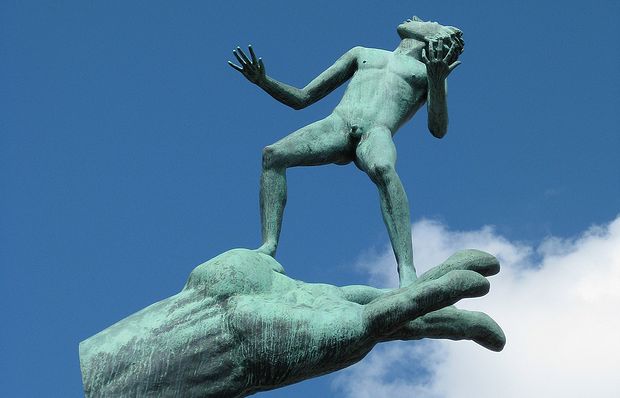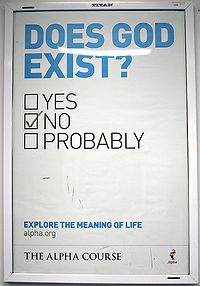I live in Spain, where one in every three people between 18 and 29 years old don’t believe in the existence of God. Many other countries share a similar statistic. You might be an atheist yourself or, if not, surely know someone who is.
 The Hand of God / thomas alan (Flickr - CC BY-NC-SA 2.0)
The Hand of God / thomas alan (Flickr - CC BY-NC-SA 2.0)
I live in Spain, where one in every three people between 18 and 29 years old don’t believe in the existence of God. Many other countries share a similar statistic. You might be an atheist yourself or, if not, surely know someone who is. Possibly we all would agree that some questions serve as arguments against the existence of God for many, if not most, atheists. Some of these questions are: if God exists, why is there so much suffering in the world? If God exists, why doesn’t he speak to humanity more clearly or tangibly? If God exists, why hasn’t anyone been able to prove his existence? And so on.
These are undoubtedly questions that need to be addressed, but that is not my intention in this article. Actually what I want to do is ask more questions, but from another perspective. Let me invite you to briefly look at the other side of the coin and consider four questions in relation to the existence of God.
First, if God does not exist, how can we have any sense of justice in the world? I believe we all agree that trafficking human beings is wrong and providing food for those who are hungry, for instance, is right. But on which basis do we classify something as right or wrong? Who established these moral standards that we all know exist apart from our own opinions? As C. S. Lewis expressed: “My argument against God was that the universe seemed so cruel and unjust. But how had I got this idea of just and unjust? A man does not call a line crooked unless he has some idea of a straight line. What was I comparing this universe with when I called it unjust?”[1]
Secondly, if God does not exist then how was everything created from nothing? Why is there something rather than nothing? We might have different opinions on the origins of the universe and its age, but we all agree it’s not eternal and therefore there was a moment it came into existence. But how could it have come into existence if there was absolutely nothing before? Matter and energy do not originate from nothing; everything in the universe has a cause outside of itself. Have you ever taken your imagination back to that moment and honestly pondered on the Cause behind every cause? Francis Collins, renowned scientist and leader of the Human Genome Project, has written: “And the very fact that the universe had a beginning implies that someone was able to begin it. And it seems to me that that had to be outside of nature.”[2]
 Does god exist? / Ludwig van standard lamp (Flickr - CC BY-NC-SA 2.0)
Does god exist? / Ludwig van standard lamp (Flickr - CC BY-NC-SA 2.0)Thirdly, if God does not exist, how come human beings exist? The chances of a universe such as ours to be created randomly are virtually non-existent. Dr Collins writes: “When you look from the perspective of a scientist at the universe, it looks as if it knew we were coming. There are 15 constants: the gravitational constant, (…) nuclear force, etc. that have precise values. If any one of those constants was off by even one part in a million, or in some cases, by one part in a billion, the universe could not have actually come to the point where we see it. (…) There would have been no galaxy, stars, planets or people.”[3] Stephen Hawking interestingly expresses: “it would be very difficult to explain why the universe would have begun in just this way except as the act of a God who intended to create beings like us.” [4]
And in fourth place, if God does not exist, how come millions upon millions of people have attested to a personal relationship with him throughout human history? People all over the world, from all sorts of social, intellectual and cultural background believe and live by their faith in a real and personal God. They affirm to be reached by his love, touched by his grace, convicted by his holiness and directed by his words. Their lives have been visibly changed and their relationship to others clearly improved after what they describe to be an encounter with Jesus. Have you considered the possibility that these millions and millions of people might be speaking the truth? Have you ever taken some time to sincerely listen to one of these people’s experiences?
As stated before, I have no pretension to convince anyone of God’s existence through the four questions above. My intention is to invite you to a frank and honest reflection as you try to look at your view about God from another perspective. May I invite you to sincerely reflect on your perception of the most important subject any of us could ever consider? May I invite you to search for more? May I invite you to be honestly open?
_______________________________________
[1] C.S. Lewis, Mere Christianity. Let me open a parenthesis and suggest two books that present the Christian case respectfully, logically and solidly: “The Reason for God” by Timothy Keller and “Mere Christianity”, by C.S. Lewis.
[2] Ref. – Interview of Francis Collians athttp://www.salon.com/books/int/2006/08/07/collins/index2.html …Ref. in “The Reason for God,” T. Keller, Dutton, 2008
[3] Ibid.
[4] Stephen Hawking, A Brief History of Time, p. 127

Las opiniones vertidas por nuestros colaboradores se realizan a nivel personal, pudiendo coincidir o no con la postura de la dirección de Protestante Digital.
Si quieres comentar o